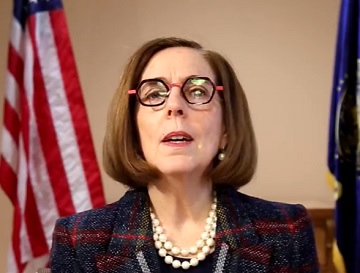Brown retaliated by imposing regulations on state agencies
The battle over climate regulations continues. The latest skirmish is a petition which has been filed by
Oregon Business and Industry -- a statewide business lobbying organization that describes itself as "the largest and most effective statewide business advocacy group in Oregon" -- with the Oregon Court of Appeals to request judicial review of environmental rules crafted at the Department of Environmental Quality.
The
petition for review of Greenhouse Gas Emissions Program 2021 Rulemaking is a response to Governor Kate Brown's
executive order requiring state agencies to adhere to strict climate regulations. This order, in turn, was given as a response to a Republican walk out during the 2020 Session over
SB 1530, which was sweeping climate legislation.
The rules were adopted during a
special meeting of the Environmental Quality Commission, the Governor's appointed board that oversees the Oregon Department of Environmental Quality
According to the petition, "The CPP Rules aim to reduce statewide greenhouse gas (“GHGâ€) emissions by 90 percent by 2050. To achieve that sweeping objective, the CPP Rules primarily target suppliers of natural gas, gasoline, diesel and other covered liquid and gas fuels. Among other things, the CPP Rules set, and make fuel suppliers responsible for meeting, a total statewide limit (which declines annually) on GHG emissions. In other words, the CPP Rules hold fuel suppliers directly accountable for the GHG emissions from covered fuels used by all Oregonians. The CPP Rules were designed to limit the availability of covered fuels and thereby make it too expensive to combust those same fuels in Oregon, or in certain cases, to prohibit manufacturing facilities from using specific fuels. But because business and consumer use of these fuels is central to Oregon’s economy, the CPP Rules will have a profound and unprecedented impact on everyday life in Oregon. "
When the legislature failed to pass the legislation because of the Republican walk out, Governor Brown retaliated by imposing regulations on state agencies.
--Staff Reports| Post Date: 2022-04-03 14:04:07 | Last Update: 2022-04-03 16:12:34 |






